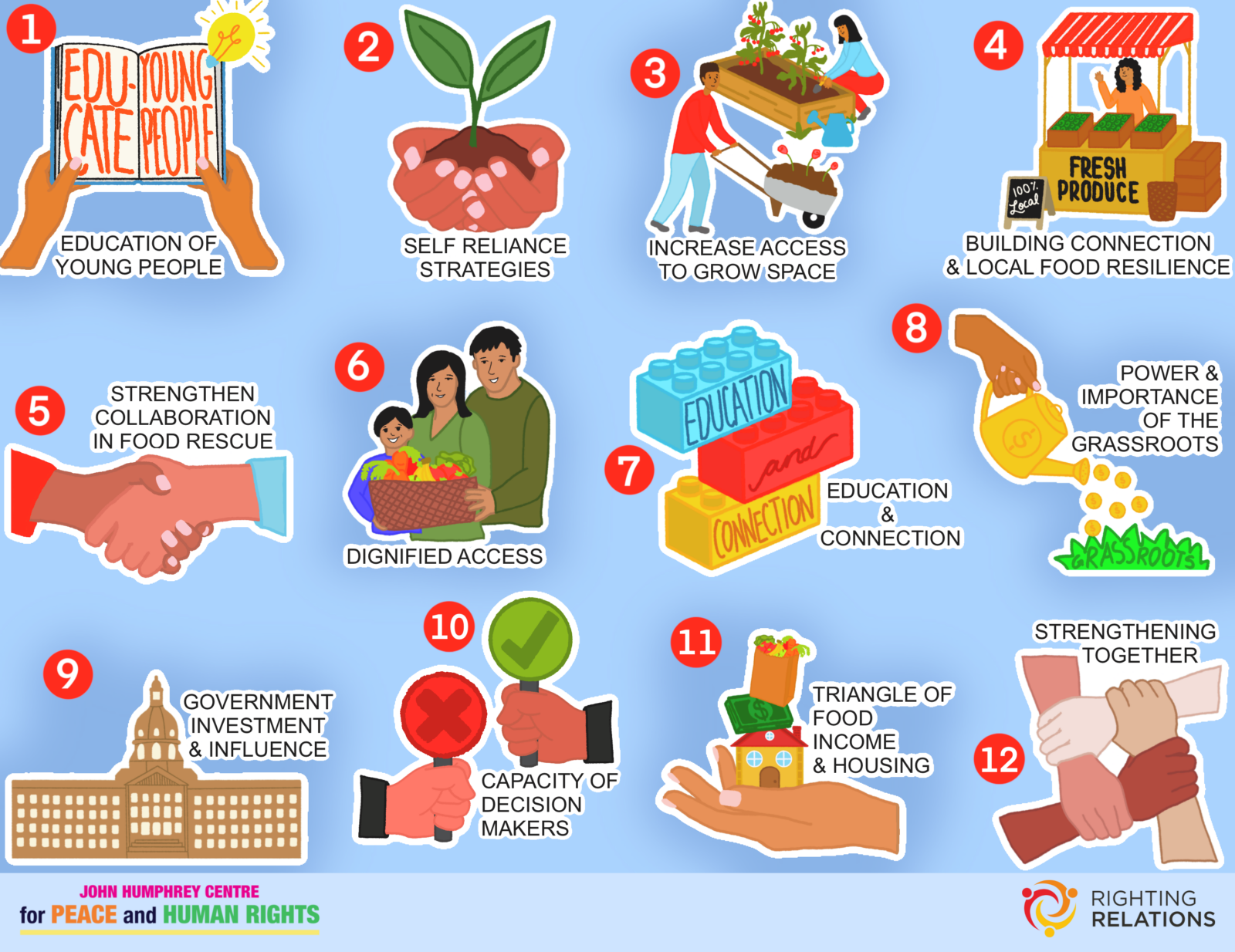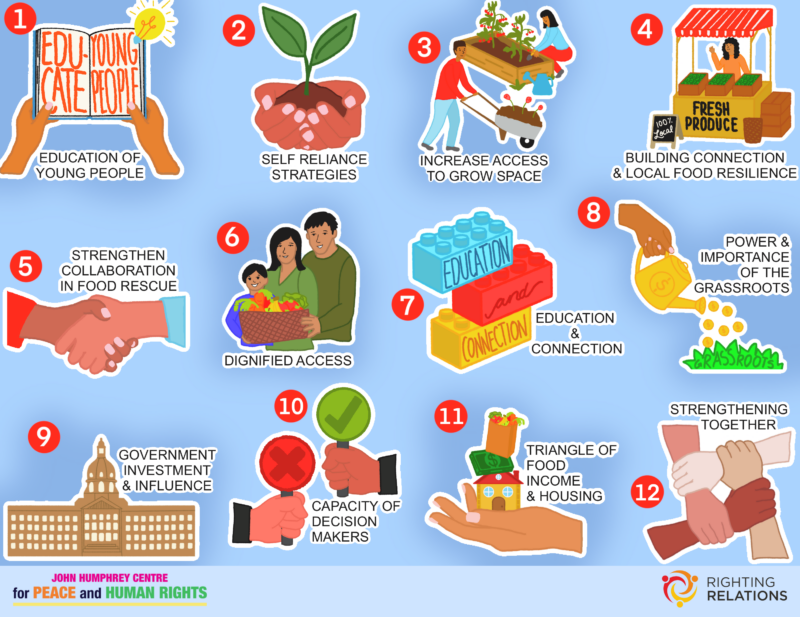National Level Calls to Action
Sources:
John Humphrey Centre and Righting Relations (Designed by Esther Dimalanta)
Rights of Use:
CC-BY-NC-SA


Back in March of this year, we hosted a Canada-wide national conference on the Agenda 2030 SDG goals on Righting Relations with Food. Here are the high level learnings that emerged:
1. Education of Young People (Alberta)
There is an urgent need to educate young people to ensure the next generations are better informed and have resources and skills to avoid food insecurity and navigate climate change. Food literacy should be built into the curriculum so we can increase capacity and self reliance for children at all ages. It needs to become part of culture and way of being. While we understand the provincial government has jurisdiction over the majority of education, we believe national governments must play a role and ensure there is a mandate and investment into curriculum development. Indigenous children should have access to traditional teachings such as the Three Sisters’ teachings and land-based learning that honors their history and culture.
2. Self-Reliance Strategies (Regina)
Creating opportunities where community can engage in their own growth and production of food is empowering and creates stronger capacity for self reliance. There is a need to create accessibility for community members of all ages to access skill-based learning to enhance their knowledge and capacity for self-reliance and food sovereignty. Drying fruits, vegetables, rice and other items can be economical and addresses food security issues when you teach people how to use these methods. Strengthen growing, processing and storing of food through collectives and at the individual level. When we focus on more locally produced and grown, it leads to less waste and less environmental impact. On the individual level we are creating autonomy and education for people to grow their own food. Example; Investing in strategies including: community hubs, community gardens and kitchens, backyard chicken coops, urban food forests, yardsharing and urban farming.
3. Strategies to Increase Access to Grow Space (Regina)
There must be strengthening of collaboration with rural communities, local farmers and efforts to advance land use opportunities. These opportunities would be especially beneficial for land share collaborations, education, urban farms and greenhouses. We must recognize that when we speak of crown land or municipal land, that this is intrinsically tied to Treaty relations and our complex history. Land access must include conversations on historic treaty relationships and engage Indigenous leadership around access and protection. We have much greenspace in our urban spaces – for plants and foliage with no purpose but aesthetics – we must mandate and encourage food forests, permaculture and growing of food in public spaces.
4. Localized Economies: Building Connection and Local Food Resilience (Alberta)
Creating opportunities where community can engage in their own growth and production of food is empowering and creates stronger capacity for self reliance. Centring strategies to enable this work and enable local trade of goods are an important way to build a sustainable and resilient community. We need to invest in more initiatives that allow people to access and support our local farms. We have farms not being utilized – build bridges between farmers with land and people in urban areas to grow and support each other. Part of reconciliation is increasing treaty land-sharing opportunities to promote traditional growing and hunting and also using rescue strategies like “gleaning” to access local farmers’ harvest. **GLEANING is an ancient practice that allows the collection of unharvested crops for distribution to needy populations, and was once recognized as a legal right for the poor in other countries – it is now resurfacing as a practice that is gaining popularity even in more developed countries.
5. Prioritize and Strengthen Collaboration in Food Rescue (Regina)
Promoting education in cities on the Good Samaritan clauses that stipulate that if food is donated in a good way and follows certain protocols, that food should be grown and shared. We need a strengthened collective approach that puts more responsibility on businesses in terms of food rescue, donation and distribution of excess food. This is being done to some extent but it needs to be strengthened in order to yield better results. Recommendations such as implement a bylaw to interrupt that food waste ahead of time and provide regulation. Cooperative models and government legislation can lead to increased ability to rescue food and decrease food waste; also increase accessibility and facilitate storage of this good food so that local organizations can access and utilize it. A lot of food processors and large scale producers do have a lot of food that they sometimes do want to give away – it is sporadic. More support is needed for coordinating between producers, processors and local community organizations.
6. Dignity in Access (Regina)
Cultural food acceptance needs to emphasize that food security isn’t just about having access to food, but also ensuring that the food available is acceptable to you as well. Commitment to the 5 A’s of Food Security: Agency, Adequacy, Acceptability, Availability, and Accessibility. Supporting local initiatives that are accessible in all communities: Community Hubs, Community Kitchens, Community Gardens and other local grassroots programs. Trauma-informed approach that meets people where they are and decolonization of processes that perpetuate shame and inaccessibility. Ensuring there are no barriers of identification or transportation to food is essential.
7. Education and Connection for those in Need (Alberta)
The pandemic has heightened the mental health crisis that exists; we now face an epidemic of loneliness as well as food insecurity. We need to build those connections again. In a post-covid world, we prioritize healing through connection and food solutions that ensure the voices of those who can find themselves most vulnerable are included in the conversation, including First Nations Peoples, Post-Secondary Students, persons on low income, Newcomers to Canada. We recognize that food work and solutions cannot be done in isolation, it takes a collaborative effort between grassroots and community organizations, institutions and the government and should be decided in consultation with the people. We need to identify and address the barriers those in extreme poverty face urgently and decrease them to allow ease of access to food.
8. The Power and Importance of the Grassroots (Regina)
Grassroot agencies need to be given more value for their voices. They are on the front line and have the most insight and thus able to suggest and implement the most relevant and appropriate solutions. Mobilizing and putting the power of community to work can have impactful results. These helpers carry a major burden and we need to remember that they too need support. One of the largest barriers that prevent grassroots groups from thriving, expanding and being able to apply for funding is bureaucratic barriers, most notably not having a charitable organization number #. Reducing or eliminating these barriers would assist grassroots significantly in the longevity of their work and encourage people to donate to local initiatives. Grassroots initiatives and strategies already are working towards strategies of promoting self reliance – examples: Community kitchens and community gardens, yardshare. Long term systems and policy change will take a long time and the current band aid solutions are harm reduction. We should celebrate the importance of these efforts in meeting the immediate needs for food and creating spaces for dignified access. Enabling the strength and support to this ground-level work must be complemented with systems-level change to stop the perpetuation and cycles of poverty.
9. Food First: Government Investment and Influence (Regina)
The cost of food has risen drastically, leaving many people vulnerable to food insecurity and not being able to afford or access healthy, quality food for themselves and their families. Yet not enough is being done to fund investment into food response and food rescue. Often this basic human need is left to grassroots organizations that struggle to obtain funding and keep up with the demand of the community. No level of government has a clear food strategy, there needs to be bold implementation of a poverty elimination strategy and food charters in every community. Legislation and collaboration to support Food Rescue is needed to eliminate food waste but to also ensure it can be effectively diverted to those that need it. Creating ways for farmers, agencies and communities to work together to meet the needs can go a long way for sustainability and supporting local.
10. Capacity of Decision Makers (Alberta)
There is a lack of data that accurately reflects the realities of the current state of poverty and also a disconnect between what the government believes is adequate for people to live on. There needs to be clear transparency and accountability to release this information to the public to ensure information and statistics are available for meaningful and collaborative change and informed decision-making. The need to counter misinformation and assumptions is important to decreasing the stigma of poverty and reducing barriers and shame of those living with food insecurity. No one wants to be in this position or living in poverty; reducing barriers and increasing public knowledge produces empathy and awareness. Many don’t actually understand the true extent of food insecurity or how close it is to the surface in their own community. There is also little known about “who” are the faces of food insecurity or poverty.
11. The Triangle of Food, Income and Housing: Call for Basic Income (Alberta)
Current income assistance programs are not enough, we must cut off the cycle of poverty rather than simply just managing poverty. A guaranteed basic income on a sliding scale is the foundation needed. Across all the three provinces and the national report – guaranteed basic income was placed as the most critical priority. If we can create the space where people have the resources to get what they need and build forward without having to be stuck in perpetual poverty, this could make major shifts and could in fact reduce impacts on the public dollar as it would improve health outcomes for families and children, reducing the burden on other systems. Housing is the other piece – we need a housing first program that focuses on key areas, including Indigenous-focused and transitional housing. We cannot combat Food Insecurity without addressing the first two key pieces. Make Poverty History Manitoba has been campaigning for a “Liveable Basic Needs Benefit” that would lift all Manitobans up to or above the poverty line that is transferable to other province
12. Strengthening Together (Regina)
There is richness in the variety and different approaches in our work, activities and ideas that we share when we are able to collaborate. The opportunity to collaborate and connect with like-minded organizations helps in sharing our ideas and wisdom and building connections. There are geographic differences, transportation issues and logistical issues in different parts of the provinces and nationally. We can coordinate and connect online but really each community has to have a champion. There has to be a network or conduit coordinating things efficiently – capacity and coordination of our work is critical. We must reflect and ensure that all voices are at the table, and that no one is left out when it comes to advocacy, engagement and building strategies from collaboration. There is a need to organize and collectively advocate to address policy around poverty and food security. It’s important to work in collaboration with other organizations with the same concerns to strengthen the call, the ask and the voice. Building space for connection and direct service outreach among agencies strengthens the capacity to leverage each other’s unique skills, talents and community connections.
Posted Under:
advocacy, calls to action, Canada, food, food insecurity, food sovereignty, Graphics, human rights, National, Original Content, Readings, Reports, SDGs, social change